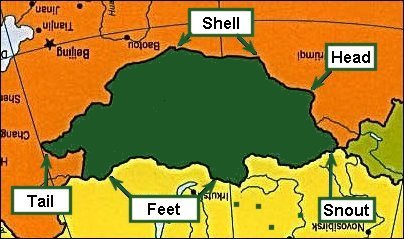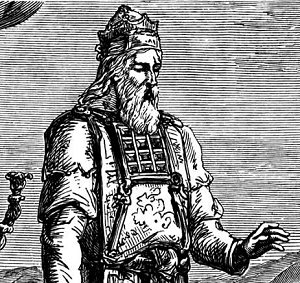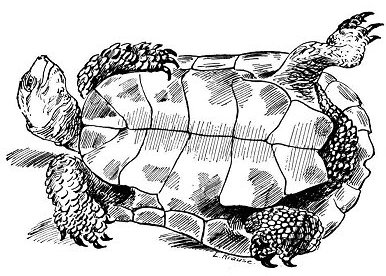
Mongolia

Mongolia is the world's largest land-locked nation, and it has no
navigable rivers that reach the sea. Most of the nation is above 3000 feet, and
it's comprised mostly of grasslands and desert plus a couple of mountain ranges.
This is quite ironic because Mongolia is shaped like (after we turn it upside
down)...

... a turtle!

However, Mongolia is upside down on its back.

Why is Mongolia shaped like a turtle? I believe it has mostly to do
with its proximity to China. Recall from the study on China and south-east Asia
that it's shaped like a camel:

So that makes Mongolia a breastplate for the Chinese camel. The point is
that Mongolia makes China a religious camel, even a high priest because it was
the high priest that wore the breastplate. By 'religious camels' I mean the
Pharisees and Sadducees who strained at the gnat, but swallowed the camel
(Matthew 23:24). I like to think that if you swallow a camel, you are a camel (you are what you eat). They were only
acting like priests. Only the high priest wore the breastplate, but I believe
it's here to focus our attention on false priests. The following drawing illustrates what the true breastplate may have looked like on an Israelite priest.

The breastplate is described for us in Exodus 28:
15 And thou shalt make the
breastplate of judgment with
cunning work; after the work of the ephod thou shalt make it; of gold, of blue,
and of purple, and of scarlet, and of fine twined linen, shalt thou make it. 16
Foursquare it shall be being doubled; a span shall be the length thereof, and a
span shall be the breadth thereof. 17 And thou shalt set in it settings of
stones, even four rows of stones: the first row shall be a sardius, a topaz, and
a carbuncle: this shall be the first row.
18 And the second row shall be
an emerald, a sapphire, and a diamond. 19 And the third row a ligure, an agate,
and an amethyst. 20 And the fourth row a beryl, and an onyx, and a jasper: they
shall be set in gold in their enclosings. 21 And the stones shall be with the
names of the children of Israel, twelve, according to their names, like the
engravings of a signet; every one with his name shall they be according to the
twelve tribes.
This is all the more interesting because turtles and tortoises literally have breastplates. They're usually referred to by their technical name, a plastron:

It usually consists of 12-13 plates, and 12 is even the number of gems
that the high priest wore on his breastplate.
Another interesting connection involves a few turtles with plates that have prominent growth rings, and so the plates on their shell look like gemstones. A good example is the Diamondback Terrapin:

The only place that turtles or tortoises occur in the Bible is in the health laws of
Leviticus 11:
29 These also shall be unclean unto you among the creeping things that creep upon the earth; the weasel, and the mouse, and the tortoise after his kind,
The Hebrew word for tortoise is tsab (Strong's Concordance #6632). It also means a 'canopy' or a 'palanquin' which are covered couches carried on wooden shafts by four men (and incidentally, that's how the ark of the covenant was carried, Exodus 25:14).

Tsab is also translated 'covered' and 'litters' - a litter is
another word for a palanquin. The latter occurs in Isaiah 66:20, and the former
in Numbers 7:
1 And it came to pass on the
day that Moses had fully set up the tabernacle, and had anointed it, and
sanctified it, and all the instruments thereof, both the altar and all the
vessels thereof, and had anointed them, and sanctified them; 2 That the princes
of Israel, heads of the house of their fathers, who were the princes of the
tribes, and were over them that were numbered, offered:
3 And they
brought their offering before the LORD, six covered wagons, and twelve oxen; a
wagon for two of the princes, and for each one an ox: and they brought them
before the tabernacle. 4 And the LORD spake unto Moses, saying, 5 "Take it of
them, that they may be to do the service of the tabernacle of the congregation;
and thou shalt give them unto the Levites, to every man according to his
service."
It appears that these covered wagons were used to carry the tabernacle and its furniture from place to place. I find it interesting that the Hebrew word for tortoises is associated with both the 'covered' wagon and the 'litter', because both involve traveling. The root word (tsabab) means 'to go slowly' (according to the Gesenius Hebrew-Chaldee Lexicon to the Old Testament), and we all know how tortoises are famous for traveling very slowly.
Imagine how the tabernacle would function if we replaced the ark with a tortoise; or in other words, put a reptile like Satan in the holy of holies (2nd Thessalonians 2:4). I like to think of the ark as the brains of the operation for the tabernacle (Numbers 7:89). If Satan was in control, the rest of the house of God wouldn't function very well would it? I believe that's why the turtle is sooooooo... slow. Satan is as mentally slow as a turtle compared to our Father Who is not only faster than lightning, He made lightning.
|
©2006 God's Geography |